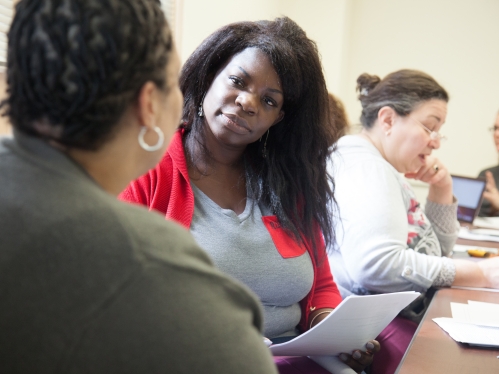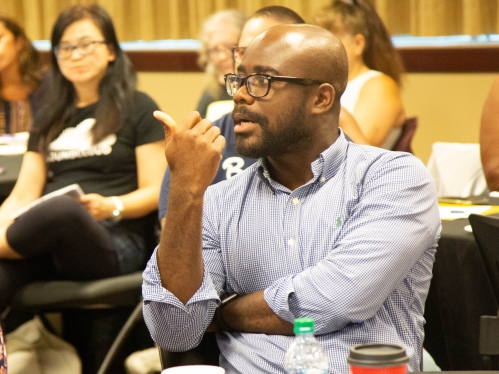
Office of Practicum Learning
Office of Practicum Learning
The Office of Practicum Learning provides experiential, practical learning to help you become the agent of change you envision. Our practicum education program, based upon educational policies and standards established by the Council on Social Work Education, helps prepare you to become a practicing professional social worker.
MSW students will spend 12 out of 60 credits and spend 900 hours in practicum. Students in the BASW program will spend 450 hours in practicum learning. You will make a difference while you are being trained, and you will continue to make a difference after you receive your degree and social work licensure. In each practicum, which is both an academic course for degree credit as well as a practicum learning experience, you become socialized into the social work profession. You serve alongside professional social workers and are supervised by experienced practicum instructors. The core professional competencies that you acquire and demonstrate while working in practicum learning are the evidence of your success.
Rutgers School of Social Work formally affiliates with a variety of practicum learning agencies to provide you with training opportunities across the spectrum, including:
Addiction-focused | Aging | Behavioral Health | Child Welfare | Criminal Justice | Crisis Intervention | Developmental Disabilities | Homelessness/Housing | Healthcare/Hospitals | Interpersonal violence prevention and counseling | LGBTQIA+ programs | Mental health | Macro focused programs (policy, fundraising, program management) | Schools | Trauma-Informed Care
Want to get a glimpse into one student's practicum experience? MSW student Nimit Kaur, who is doing practicum work at Youth Consultation Services (YCS), was recently spotlighted in a newsletter about her work with YCS.


An Update from our Office
Rutgers School of Social Work decided to replace the term "field" with "practicum." Mark Lamar, MSW, MBA, LCSW (Associate Professor of Professional Practice & Executive Director, Office of Practicum Learning) and Sherie Augustin, MSW, LCSW (Senior Program Coordinator) engage in a conversation on our rationale behind the change.
The following is a general overview of the practicum process. For more detailed and specific information by degree program, we encourage students to connect with their practicum advisor (see contact information at the bottom of this page).
- Complete the practicum planning form
- A member of practicum learning team will be in touch with you about placement opportunities
- Interview with prospective agency
- Once accepted, complete and return the practicum confirmation form
- Complete any onboarding or necessary training
- Begin placement!
For more specific information on specific MSW program information, visit the 100% Online and Intensive Weekend practicum education pages.

Sample Practicum Learning Documents
What can students expect from their practicum learning experience?
- To complete a learning contract with the agency that includes tasks and assignments from all the social work competencies
- To increase their client –facing skills through various experiences
- To submit reflective assignments related to their practicum experience
- To meet regularly with an MSW supervisor for guidance and mentorship
- To build skills needed to become a professional social worker
- To receive support from the practicum learning office and a practicum liaison throughout placement
- To receive an evaluation of their performance
All forms are available in the Canvas practicum learning course students will be enrolled in once they begin their placement.
The following are examples of forms that might be completed during placement.



-
No, but you will work with our practicum learning team to determine the most appropriate setting based on your unique situation.
-
Yes. Each student will complete a practicum planning form which provides the practicum learning team with more information about what you are interested in.
-
Practicum learning will provide you with opportunities to gain hands-on experiences within the social work field. Our agency settings range from counseling centers to government agencies to healthcare facilities and everything in-between.
-
Yes. Students are responsible for any required clearances including background checks, medical clearances, and drug testing.
-
If you work in a social work-related agency, this might be possible with approval from the employer and Rutgers.
-
We require all supervisors to have their MSW and 2+ years of post-graduate experience. Supervision should occur for 1 hour each week.
-
We have many different placements and program formats, so reviewing those requirements would be important to consider when planning for the practicum process. The majority of placements take place during normal business hours (Monday-Friday, 9am-5pm), so having flexibility would be essential.
Practicum Learning Agencies
The Office of Practicum Learning is built on a network practicum learning agencies and dedicated professionals across the country. Students benefit from working with our practicum learning teams through hands-on experience and lessons in what it means to be a professional social worker. Agencies can benefit from having an extra, eager set of hands to help move their organizations goal forward.

Become a Practicum Learning Agency
For any agencies or social workers who might be interested in partnering with us to host MSW practicum learning students, please complete the MSW/BASW Program Agency Interest Form. Once we receive your form, a practicum learning representative will be in touch with you to learn more about your program and needs.
What we look for in a practicum learning agency
- Provide students the opportunity to develop an identity as a professional social worker and conduct themselves accordingly by providing learning experiences that enable the student to demonstrate the nine competencies
- Provide students with an orientation to the agency, its services, personal safety, policies and procedures and the community
- Provide a qualified MSW Practicum Learning Instructor for each student. The Practicum Learning Agency should support the Practicum Learning Instructor in assigning the student a sufficient number and variety of assignments for learning
- If the Practicum Learning Instructor has never supervised a student, she or he must take the Seminar in Practicum Learning Instruction course concurrently with the student’s placement
- Practicum Learning Instructors must be in compliance with all state licensing laws and regulations for their scope of practice as defined by their state Board of Social Work Examiners and the regulations of the agency

Seminar in Practicum Instruction
Rutgers offers an online course in practicum instruction that offers 20 CEU’s for your participation. The online course is self-paced, offering the opportunity to learn more about the supervision process, as well as the practicum process. The course consists of eight units, each having a presentation, readings and a Unit Quiz. More information about enrolling in this course will be sent to the identified practicum learning instructor. Participants will receive 20 continuing education units upon completion of the program.




-
- Agencies selected for practicum learning sites are drawn from a wide range of agencies and reflect the diverse settings where professional social workers are employed. The School requires that agencies have a clear definition of the social work role, and that the function be supported in the agency so that students will be able to acquire and strengthen their identification as social workers. There must be appropriate assignments and a qualified MSW with available time to supervise a student, along with a commitment to teaching the core competencies and practice behaviors outlined in the learning contract and evaluation.
- MSW Supervisor/Practicum Learning Instructor –Practicum Learning Instructors are required to have an MSW and two-years post graduate experience
- Practicum Learning Instructors will review and comment on students’ process recordings and are required to meet with students for 1 hour each week for supervision.
- Practicum Learning Instructors may be involved with the student on a daily basis, or students may also work with a task supervisor.
-
Each student is assigned a Practicum Learning Liaison, who interacts with the student and the agency. The Practicum Learning Liaison will make at least one remote or in-person visit each semester to meet with the Practicum Learning Instructor and the Student.
- Regular contact will be provided between students, practicum learning instructors, and online program staff to ensure the practicum learning placement is proceeding well.
- You will also receive access to our Practicum Learning Instructor newsletter and webinars related to supervision topics.
-
No, you do not need to be certified to begin the interview process. We do highly recommend the certification and will offer it to you once your intern begins placement.
-
Practicum learning students can help with counseling sessions, completing intakes, case management, outreach, researching best-practices, creating curriculum, and more.
-
Yes
The Importance of Self-Care
Explore the variety of self-care resources.
Practicum Learning Education Roles
Our Team Structure
Executive Director | Chief executive officer of the Practicum Learning Department and oversees and manages field operations. The Executive Director develops new practicum learning opportunities and assures program compliance with Council on Social Work Education (CSWE) standards.
Practicum Learning Associate Director/Director/Assistant Director | Oversees program/campus practicum learning. Consults with students in arranging practicums, monitoring student placements and is accessible to students and practicum learning agencies offering consultation in all aspects of the practicum process.
Practicum Learning Education Coordinator/Senior Program Coordinator | Arranges and monitors student placements and is accessible to students and practicum learning agencies offering consultation in all aspects of the practicum process.
Practicum Learning Liaison | Acts as the connection between the agency, the student and the school and provides support for the Practicum Learning Instructor and the student. Liaisons make agency site visits either in-person or remotely to meet with the student and the Practicum Learning Instructor at least once a semester.
Practicum Learning Supervisor/Instructor | The agency-based instructor on site; this person meets with the student weekly and prepares written evaluations at the end of each semester. The Practicum Learning Instructor must hold an MSW, and a minimum of two (2) years of employment in practicum learning since completion of the graduate degree from a CSWE accredited program.
Task Supervisor | The agency-based instructor on site who may not have an MSW but who assigns tasks to the students and oversees the student’s schedule.
Faculty Advisor | Faculty member assigned for academic advising and overall educational planning.


Meet the Practicum Learning Team
Connect with the Office of Practicum Learning and refer to the contact list included below. Team members are organized by campus or program/certificate/specialization to help better direct and support our student and community needs.
-
Bernardo Hiraldo, Associate Director of Practicum Learning and Assistant Professor
bhiraldo@ssw.rutgers.eduBijal Jobanputra, Administrative Assistant
bjobanputra@ssw.rutgers.eduJeri Middlebrook, Senior Program Coordinator
jm521@ssw.rutgers.edu -
Elsa Candelario, Director, Latina/o Initiatives for Service, Training, and Assessment (LISTA) Certificate elsa.candelario@rutgers.edu
Ryan DiMeglio, Program Coordinator, Addiction Counselor Training (ACT) Certificate
ryandime@ssw.rutgers.eduLauren Snedeker, Coordinator, Certificate in Aging and Health, and Assistant Professor of Teaching
laursned@ssw.rutgers.edu -
Mark W. Lamar, Executive Director of Practicum Learning and Associate Professor of Professional Practice
mlamar@ssw.rutgers.edu -
Amy Strickler, Assistant Director, Intensive Weekend Program and Instructor
astrickler@ssw.rutgers.edu -
Mariann Bischoff, Management and Policy Practicum Learning Specialist and Assistant Professor
mbischoff@ssw.rutgers.edu -
Mary Beth Ali, Practicum Learning Coordinator and Instructor
mali@ssw.rutgers.eduCynthia Reyes, Administrative Assistant
creyes@ssw.rutgers.eduTrinay Thomas, Associate Director of Practicum Learning and Assistant Professor
tthomas@ssw.rutgers.edu -
Jose Cruz, Senior Program Coordinator
cruzj3@ssw.rutgers.eduCecilia Harris, Administrative Assistant
charris@ssw.rutgers.eduNancy Schley, Associate Director of Practicum Learning and Assistant Professor of Teaching
nschley@ssw.rutgers.eduJoann Sekerak, Administrative Assistant
Jo73@ssw.rutgers.edu -
Sherie N. Augustin, Senior Program Coordinator-Online MSW Program
Nicole Oceanak, Assistant Director of Practicum Learning for Online-Blended Programs
Hina Rehman, Senior Program Coordinator
